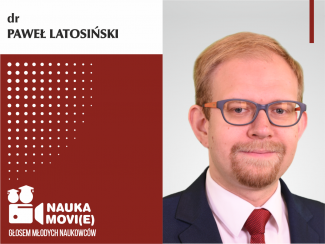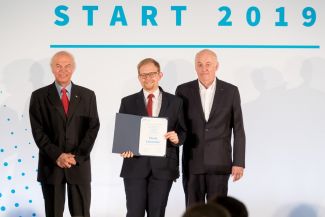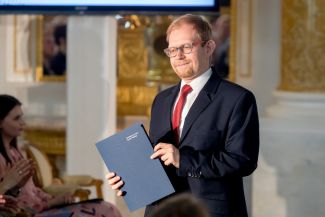Each year, the Foundation for Polish Science selects 100 laureates of the START scholarship competition. In 2019, the list of winners includes Dr Paweł Latosiński, a mathematics graduate, assistant professor at the Institute of Automation of TUL and author of articles in JCR-listed journals. He deals with control systems, and the results of this research contribute to more efficient operation of machines, among other things.
What scientific discipline do you represent?
What scientific discipline do you represent?
My research is assigned to the disciplines of automation, electronics and electrical engineering, and more specifically to control theory. I deal with sliding mode control algorithms, which are an effective method of controlling dynamic systems, even in the presence of various types of disturbances.
The methods developed by you guarantee better resistance of the system to disturbance and model uncertainty than commonly used solutions.
Very often we deal with disturbances coming from unpredictable external factors - for example, it can be wind while controlling a drone, the condition of the surface on which a land vehicle is moving, or a decrease in network capacity. When designing an algorithm controlling a given system, it should be taken into account that the readout state of the system may differ slightly from the actual state of the object (due to delays, reading inaccuracy or other factors). The advantage of the strategies considered by me is the possibility to respond quickly to such disturbances and model uncertainties, while ensuring the computational efficiency of the algorithm.
In what areas will the results of this work be applied?
They are successfully used to control robot manipulators, unmanned vehicles or power electronic converters. Some publications, including those from our Institute of Automation, suggest the use of sliding mode regulators in unexpected areas such as logistic systems or control of data transmission in a network.
What challenges are you trying to respond to?
In modern automation, increasing demands are being placed on the precision, reliability and also the energy efficiency of automated systems. Consequently, it is important to design effective control algorithms that take into account the specifications of the machine in question. In particular, an important task is to create conditions such that certain values representing the physical state of the system (such as vehicle speed or converter voltage, for example) are within safe limits. Designing an effective control method, while limiting these values, was one of the main objectives of my research.
So these solutions are individualised for each device?
Yes, although the process of adapting a given sliding mode algorithm to work in a specific system is not difficult. It only involves the selection of fixed parameters related to the dynamics of the system and its desired properties, as well as an estimation of potential disturbances that may affect the system.
When did you decide that scientific work was an activity that you would pursue professionally?
When I graduated from mathematics at the Faculty of Technical Physics, Information Technology and Applied Mathematics, I initially considered taking up doctoral studies in this particular field of study, but during one of the lectures we were visited by Professor Andrzej Bartoszewicz, the head of the Automation Institute. He was looking for students willing to undertake research in his unit. He justified this invitation by the fact that the control theory studied by automatics specialists is closely related to the issues that we learn in our mathematical studies. Having decided to accept this invitation myself, I soon realised that he was right. I can say that any mathematician can easily find their way in control theory.
Why is it worth being a scientist?
The career of a scientist constantly provides new challenges and certainly does not allow you to fall into monotony. It is a profession that allows you to follow your ambition, and at the same time to work in a friendly environment. Naturally, the vast majority of TUL graduates take up employment in the private sector and only a small percentage decide to continue their academic work. I think that many young people with high intellectual potential wrongly ignore the possibility of staying at university when planning their future. Therefore, I encourage students who feel confident in the academic environment to consider studying at a doctoral school.



